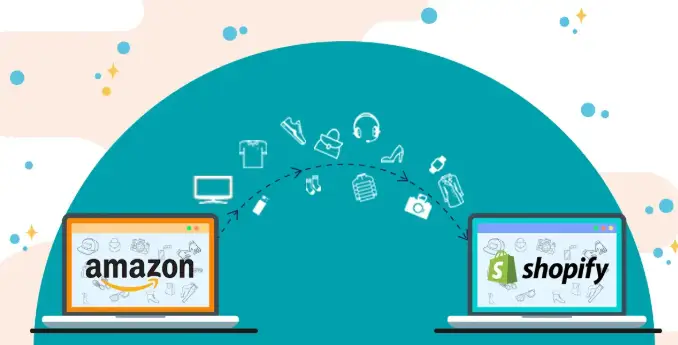If you’re in the realm of eCommerce, then you probably already have one of these powerful sales channels up and running. You’ve probably also realized one channel simply isn’t cutting it towards reaching your profit margin goals. This is where omnichannel presence is key to your eCommerce business. You need to know the perks, and limitations, each of these platforms has, both in your small business back office and on the customer experience end. Amazon and Shopify have several pros and cons to their services, which we’ll dive into deeper here in a minute. Ultimately, our expert opinion is: You Definitely Need Both!
Read on to find out why…
Amazon is a marketplace. Shopify is your own branded independent store.
Many shoppers who browse for products on Amazon are not concerned about which store, or seller, they are purchasing from. Is it possible to make a branded store with your seller account on Amazon? Sure. However, it’s safe to say that even if you take all the opportunities offered to insert your brand into your Amazon store, Amazon’s brand will prevail, and you are there more as an option, and less as a “destination” for shoppers to visit.
A Shopify store, on the other hand, gives you a more unique opportunity to personalize your online presence and truly brand yourself independently of any other platform. Shopify even allows you to totally conceal that you are indeed a Shopify store to the naked-eye of most consumers, and you can do this by uniquely customizing your template, URL, and thus, storefront.
What is Amazon?
One could think of it this way, Amazon is like a shopping mall, where you have lots of different sellers competing for the attention of prospective buyers who could very well be there just for you, or simply passing by and browsing. It’s your job to stand out and get found here amongst the plethora of other sellers competing against you to get the sales. There are several ways to improve your seller ranking, like having solid sales across states, positive customer reviews, and of course, you can become a sponsored product or brand and purchase Amazon display ads and video ads. These are conveniently plugged into the platform, but can be visible both on and off Amazon, and are purchased and managed alongside your Amazon seller account.
What is Shopify?
Shopify is more like the “brick and mortar” version of an online business, and the presence speaks to being your own unique and individual brand and entity. You build your own customer experience and have lots of creative control over what your storefront will look like, and how it functions and operates. You, of course, do not have as much control over functions like this in Amazon.
So what’s the biggest difference?
There are truly several major differences between these platforms, but perhaps their biggest difference, and the one that gets most people’s attention, is their fees. Let’s just say it like it is, Amazon has a fee for, quite literally, everything. After adding it all up, you’ll pay Amazon roughly 15% of your revenue in fees, and that’s before any costs associated with using them for fulfillment. With FBA, you’re looking at closer to 25% of your total revenue in fees. Oh, and don’t forget, if you want to really stand out, or even be found, you’ll also need to spend additional funds on purchasing their sponsored advertising.
So, it’s pretty clear that when it comes to affordability, if you are just starting up, you might want to stick with Shopify and its low hosting fee of $39/month. This will actually get you an online store to start-up and begin to sell with, but of course, this is the bare minimum you can spend. Add-ons like customized design templates (you get some for free included in the hosting package, but might desire more), fulfillment services, sales tax calculators, complex CRM, and etc, are all additional costs and can grow as you scale. What’s nice here is they don’t even have to exist if you don’t scale, because you pay for what you need, when you need it. That’s why we really like them, the fees scale as you grow, and not beforehand.
Now, if we’re talking higher volume business, their Shopify Plus version will get you started at $2,000+/month, or a variable fee, which may apply for really high volume businesses, and this you’d have to discuss with Shopify Plus directly as it truly varies on your volume and eCommerce business structure. Another option worth mentioning is to sell your products on Shopify, so you can curate your brand and customer experience, but fulfill with Amazon. Of course, you already know there are fees associated with that, but it might be worth streamlining your overhead and operations, depending on your business structure.
Next, let’s talk about CRM’s...
How can I access my customer lists, manage them, and ultimately, build customer loyalty?
We have some surprising news for many of you here: Amazon considers your customers, their customers, and they DO NOT SHARE details of your customer information with you, at all. Not surprisingly, this drives sellers into a competition war over purchasing sponsored ads, because if you want to market to your customers directly, you have no choice but to pay Amazon more money to appear in front of them. Kind of a bummer, we know.
But there is still good news for those Shopify users, you get complete control of your customer information and built-in tools to help manage and market to them. Everything you need to create sales, deals, and special offers are right in there, with super easy to integrate third-party opportunities for sales funnels, email marketing, online advertising on all the major platforms (Facebook, Instagram, Google, and more!,) This is another obvious reason we definitely recommend having both of these channels active.
What custom features are available & how many stores can I have?
In this category, Shopify takes the lead by leaps and bounds. To put it frankly, as a seller on Amazon, Amazon owns you when it comes to adhering to their Terms and Conditions 100%. They also strictly limit your ability to customize anything unique in your store, other than the product descriptions, and even these are governed by a lengthy list of rules and regulations. If you violate any of these, you could risk the termination of your selling ability. Oh, and Amazon sellers can open a second store, but only with permission, and that request has to be granted by Amazon first.
Shopify, on the other hand, is your baby. You can do practically anything you want with your store, and you can make your brand shine in as many creative ways as possible. Also, if you want to open multiple stores, go for it, there is virtually no limit to how many stores you can open on Shopify.
So what are the risks associated with selling on either of these platforms?
We’ve covered a few risks associated with selling on Amazon already, but wait… there’s more! (Insert sigh of dread here). You have probably heard the nightmare tales of when an Amazon seller wakes up and logs on just to find out their account has been shut down, quite literally, overnight. To add to this dismay, once their account has been suspended, that seller only gets one shot at pleading their case to Amazon to reopen their store. That’s right, Amazon is a one and done kinda deal when it comes to shutting down stores overnight without cause (Okay, they will say they had a cause, but even if you dispute it, and they don’t agree, that’s the end of the road for you.)
Meanwhile, there’s virtually very little risk at all when it comes to Shopify. The platform is solid and growing steadily, with a close second in popularity to our pal Amazon. Being that there is no limit to how many stores a seller can open or brands, many of our very own clients have multiple Shopify stores that we help them manage on the back end financially. That brings us to our final key point to cover when it comes to chatting risks, and that is the problem of Sales Tax.
What is eCommerce Sales …
How do I know how to calculate Sales Tax Nexus?
In the United States, sales tax is governed at the state level. There is no “national” sales tax law in the U.S. Thus, many online sellers find themselves dealing with quite different sales tax laws and rules across multiple states.
As an online business, if you are responsible for sales tax in a state, it is your responsibility to charge your buyers the correct amount of sale tax and remit the taxes you collected back to the state.
The basic rule for online sellers when collecting sales tax is:
- Your business has sales tax nexus in the same state as your customer.
- You’ll always have sales tax nexus in your home state. (*Certain business activities create sales tax nexus in other states, too.)
If you’d like to explore these concepts a bit more in-depth, book a call with one of our eCommerce accountants now.
We truly hope this article helped clear up some of the most frequently asked questions when it comes to assessing which of these two platforms best suits your needs, and why you would ultimately benefit from having both Amazon and Shopify.
Vinnie fisher is an entrepreneur, author, husband, and father of 4. A lawyer by trade, for almost ten years, Vinnie focused on tax planning, corporate formation and operation of closely held businesses. Vinnie was a principal partner in his law firm that he wound down to pursue a career as an entrepreneur. After the creation of a series of successful internet and e-commerce companies, he discovered a much needed service for business owners.
In 2014, Vinnie opened Fully Accountable, an outsourced accounting and finance firm for e-commerce and digital businesses. Today he serves as the CEO of the company. Fully Accountable a cutting edge firm that offers done for you services that includes everything from master bookkeeping to fractional CFO services. We are digital experts specializing in high transaction businesses. Our clients are all over North America. We offer a complete accounting back office for your business costing less than the price of an entry level person in your company. Our data analysts and accountants do the work and provide the proactive, forward thinking feedback you need to make the right decisions to increase your growth and double your profit margin.





